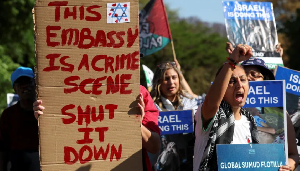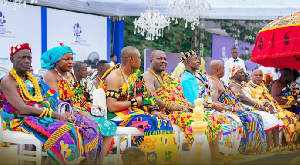-Exempts Free Zones Coys from BoG measures
-Trespassers of its land given up to Feb. 21
The Al-Hajj’s News Desk Report
The Executive Secretary of the Ghana Free Zones Board, Mr Kwadwo Twum Boafo, has announced that licensed free zones companies operating in the country are not affected by recent stringent measures announced by the Bank of Ghana to shore up the ailing Ghana cedi.
According to him a careful scrutiny of the measures announced by the central bank revealed that the act establishing the GFZB, Act 504 of 1995, exempt companies under the free zones programme from all the directives.
Speaking at an open forum organized by the GFZB for companies operating under its enclave to clarify the BoG directives regarding trading in the country, Mr Twum Boafo stated that “after receiving several calls from managers of licensed free zones companies when the BoG announced its measures, I am happy to announce that free zones companies have nothing to worry about the measures.”
He revealed that when the central bank announced the measures, his office was inundated with calls from managers of licensed free zones company who were seeking clarification on some of the measures, a situation he said warranted his meeting with the President and officials of the Bank of Ghana.
“When I relayed your concerns and questions to the President and the officials of the Bank of Ghana, they treated it with the need expedition and upon further deliberations, it emerged that free zones companies are not affected by the measures,” he recounted.
Providing much insight into the exemption at the well-attended forum, a representative from the BoG, Dr Johnson Assiamah, who sat in for the Secretary of the Central Bank noted that indeed licensed free zones companies are exempted from the directives but had to exercise caution on the directive that debars trading in foreign currency accounts.
He said though the GFZB act allows free zones companies to transact business through Foreign Exchange Accounts, the recently announced measures prevent them from transferring money from an FEA into a third party foreign account.
“A free zones companies can transfer money from its foreign account to another free zones company’s foreign account; what cannot be done for a free zones company to transfer money from its foreign account to a non-free zones company’s foreign account and vise-versa,” Dr Assiamah noted.
Dr Assiamah said the rules governing FCA in the case of licensed free zones companies are the same rules guiding Foreign Exchange Accounts (FEA), adding “free zones companies can transact business themselves through FEA but cannot do same with a third party company that is a non-free zones company. The same way a non-free zones company cannot transact business through FEA with a free zones company.”
Assuring companies of the central bank’s resolve to ensure businesses thrive in the country to create more jobs, the BoG official stated that Bank of Ghana did not come up with the measures to destabilize or ‘kill’ any business; rather it was in the interest of the larger society that the measures were taken to make the economy more resilient and robust.
The Central Bank on February 4, 2014 announced a series of measures toward arresting the fast depreciation of the Cedi. It revised rules governing the operations of FEA and FCA.
It ordered authorized dealers not to sell foreign exchange for the credit of FEA or FCA of their customers. It also stated that cash withdrawals over the counter from FEA and FCA shall only be permitted for travel purposes outside Ghana and shall not exceed US$10, 000.00 or its equivalent in convertible foreign currency, per person, per travel.
Also, no bank shall grant a foreign currency denominated loan or foreign currency linked facility to a customer who is not a foreign exchange earner, it added.
Since the measures were announced the cedi has started picking up against major trading currency, a development many have lauded the BoG and mangers of Ghana’s economy for responding to the problem expeditiously.
…Gives trespassers of its lands up to Feb. 21
In another development, squatters occupying the free zones enclave at Tema community 21 have up to Friday, February 21, 2014 to vacate the 152 acre land or risk an Adje-Kojo-like demolition, the acting deputy Executive Secretary of Ghana Free Zones Board, Madam Oboubia Darko Opoku has disclosed.
Authorities of the GFZB say the squatters have occupied the site for the past thirteen years and efforts to get them off the land proved futile, a situation authorities say has retarded development of the enclave into a Free Zones residential area.
According to Madam Oboubia Darko Opoku, the decision to eject the squatters was to pave way for local investors who have shown interest to commence the development of the site into a world class residential enclave.
At a media briefing before touring the site with the press last Thursday, the acting deputy Executive Secretary said the site which was declared a free zones area in 1997 by then President Rawlings has been earmarked for residential enclave for the GFZB.
She said “the development of the site will create jobs for artisans such as masons, carpenters, painters, welders, plumbers as well as other professional artisans in the real estate industry, she said.”
Madam Oboubia Darko Opoku who was the NDC’s parliamentary candidate in the Weija-Gbawe constituency in the last election, noted that though some squatters have complied with the GFZB’s directive to vacate the premise, some hardened ones have turned death ears to the numerous ejection notice.
Failing to vacate the site, the GFZB has given the squatters up to Friday, February 21, 2014 or “face the consequences of their default”. The Free Zones Board is expected to begin developing the land by the first quarter of this year.
Shot of mentioning names, Madam Oboubia revealed that, they (the Board) have found a local investor to develop the entire site into a state of the art enclave, adding that proposed drawings have been presented by the investor for approval.
Responding to a question on whether the eviction would not add up to the hardship been experienced in the country, she said , ‘’we are embarking on a course to reclaim what belongs to us and the time to do that is now’’.
This is not the first ejection notice of GFZB, the Board has issued several ejection notices to the squatters out of which some, including farmers have moved out but some recalcitrant ones are still occupying the land.
The Tema community 21 free zones enclave was part of lands compulsory acquired by the Colonial Government in 1952. The acquisition was carried out by the Tema Town and Port under the acquisition of land Ordinance (number. 38 of 1952).
On his part, Mr. Nsiah Asante, the GFZB Head of Residential Enclave, said there was the need for the Board to reclaim its property and use it for its proposed purpose to generate income and jobs for the country.
He said’’ we cannot allow indiscipline to swallow this country all because we say we are social democrats, we need to set the records straight and the right time to eject the squatters is now.’’
The land is currently been occupied by some churches and schools. It also has artisans such as masons, mechanics, and scrap dealers among others.
Brief Background
GFZB Tema Community 21 Land
The community 21 land is approximately 152 acres and has been declared a free zone area earmarked for residential and related purposes.
This parcel of land was part of land compulsorily acquired by the Colonial Government in 9152. The acquisition was carried out by the Tema Town and Port (Acquisition of Land) Ordnance (No. 38 of 1952)
The Colonial Government in 1956 demised the land to the Tema Development Corporation (TDC). As at 1972, the Tema Development Corporation had still not developed Community 21 and therefore granted agricultural leases to some farmers. The term granted varied from tenant by the highest term was twenty-one (21) years. The offer letters issued by TDC to the farmers contained a provision which subjected the leases to new policies, rules or bye-laws adopted or passed by the Tema Development Corporation and or Government of Ghana. All the leases had expired by 1996.
The Tema Development Corporation did not renew the leases upon expiration and wrote to all farmers to cease all agricultural activities on the land and vacate the land by end of 1996. Some of the farmers complied and vacated the land.
The president of Ghana, in 1997, duly declared Community 21 a free zone residential enclave in accordance with section 71(1) of the Free Zone Act, 1995 (Act 504). The Gazzette publication is contained in the No. 17 issue of the Commercial and Industrial Bulletin dated Friday, 19th September 1997.
The land was fenced with barn wire to ward off encroachers. Ghana Free Zones Board was at the verge of leasing the land to a free zone developer to transform it into a first class residential estate when suit was filed by seventeen (17) farmers who did not want to vacate the land.
Litigation initiated by farmers
The seventeen (17) farmers claimed against TDC; a declaration that TDC was not entitled to re-enter their respective lands, and an order for perpetual injunction restraining TDC from re-entering. Ghana Free Zones Board joined as Co-defendant.
On 29th October 2004, the High Court, Tema, gave judgment in favour of the Tema Development Corporation and Ghana Free Zones Board. Ghana Free Zones Board was adjudged the owner of community 21.
Being dissatisfied with the High Court’s decision, the farmers appealed to the Court of Appeal. On 17th July, 2008, the Appeal Court unanimously affirmed the High Court decision and dismissed the appeal filed by the farmers. Ghana Free Zones Board has to date not been served with a notice of Appeal and the time for appealing has long elapsed.
Aftermath
After the long wait for the Court verdict, the investor lost interest in the project. By 2008, the encroachers had pulled down several portions of the barb wire fencing. GFZB at huge fenced the whole parcel again and mounted notices at vantage points; warning trespasses to “keep off” the land. Some of these notices have already been vandalized by the encroachers. In December 2012, GFBZ with assistance from the National Security Council pulled down some illegal structures and gave all the encroachers up to the end of 2012 to vacate. This action was however not enough to ginger the hardened ones to vacate the land. The encroachers are auto mechanics, traders, churches and some squatters who have put up structures. All the encroachers were once again put on notice to vacate the land by 31st January, 2014. Our Surveillance has revealed that a few have complied.
Roadmap for Community 21
GFZB has found an investor with the requisite capital to develop Community 21 into a World Class Residential Enclave. Drawings and a proposed land use plan have been presented by the investor who has already made some financial commitments. The Community 21 Project will commence by the end of the first quarter. The development of a residential enclave will create jobs for artisans like mason, carpenters, painters, wielders, plumbers and other professional in the real estate industry.
We are taking this opportunity to give the encroachers, who have still not yet vacated the land the final warning to do so or face the consequences of their default not later than Friday, 21st February, 2014.
About The GFZB:
Ghana Free Zones Board (GFZB) since it was established on August 31, 1995 by an Act of Parliament has led the pact in investment promotion and attracting investors both locally and internationally to site-up in Ghana.
The GFZB has attracted companies to invest in almost all the sectors of the Ghanaian economy as a result of which authorities of GFZB say has generated about 31, 005 employment opportunities.
These employment opportunities which include 29, 511 direct engagement for Ghanaians was the result of the 225 companies registering with the investment promotion agency since 1996.
The Free Zones Board operates into sectors such as oil and gas, renewable energy, information and Communication Technology (ICT), Textile/Apparel Manufacturing, Agro-food Processing, Seafood Processing, Jewellery/Handicraft Production, Metal/Hand Tool Fabrication, Floriculture, Light Industry/Assembling Plant, Ceramic Tiles Manufacturing and Pharmaceuticals among others.
The Board has vast lands all over the country declared as free zones enclaves which they are gradually wooing investors to start developing.
Due to delay in the development of some of their enclaves, which authorities blamed on encroachment by squatters who sometimes fail to vacate the land, the Board has begun plans to start using legitimate means to eject illegal occupants from their lands.
Just last week Thursday, the GFBZ at a press conference announced Friday, February 28, 2014 as deadline for squatters on their 152 acre land at Tema Community 21, which they say they have found a local investor who has made some financial commitment and has also submitted proposed drawings to develop it into a state of the art residential facility.
At the well-attended press briefing addressed by acting Deputy Executive Secretary, Madam Oboubia Darko Opoku, ably supported by Head of Legal Aids at GFZB and Head of Residential Enclave, the authority warned the squatters to vacate the land at the said date or face demolition.
The community 21 land is approximately 152 acres and has been declared a free zone area earmarked for residential and related purposes.
This parcel of land was part of land compulsorily acquired by the Colonial Government in 9152. The acquisition was carried out by the Tema Town and Port (Acquisition of Land) Ordnance (No. 38 of 1952)
The land was later declared a free zones enclave in 1996 by then President Rawlings after the Tema Development Corporation failed to develop. The GFZB says but for the squatters, the land would have been developed long ago as there were investor who shown interest in it.
The Free Zones Board arguably remains the leading investment promotion entity in the country. During the novel election petition hearing where there was ample evidence pointing to the fact that investors were unwilling to set up in Ghana, the GFZB managed to woo top US companies into the country.
Investor Support Services Manageress, Hajia Hanatu Abubakar, at a press soiree during the election petition hearing said the GFZB had succeeded in wooing some top American Companies who are ready to invest in certain key sectors of the economy.
This she said was made possible following GFZB’s participation in an Africa Global Economic and Development Summit in California organized for selected African countries with stable business climate to outdoor business prospects in their countries to American companies.
The Summit, attended by about 54 countries from around the world was intended to connect countries, particularly nations from Africa and their businesses to US companies. According to the Investor Support Services Manageress, it was to also promote bilateral foreign direct investment, internal trade, cultural exchange and tourism.
Even in the midst of the uncertainty surrounding the election petition, Hajia Hanatu Abubakar said, lots of US companies were fascinated by Ghana’s conducive business climate and therefore, willing to come and set up in the country, which was expected to create 3000 and 2000 direct and indirect employments respectively for the teeming youth of Ghana who are jobless.
Also, whiles there was intense fear and panic heralding the Supreme Court verdict on the election petition, the Executive Secretary of the GFZB, Mr. Kwadwo Twum Boafo announced that Ghana was open for business as the country has already become the preferred destination for enterprises in West Africa.
Mr. Twum Boafo said the nation was the favored destination because Ghana has a policy of not expropriating investments; therefore investments are safe in the country. On top of that, a conducive environment is provided for the investment because Ghana believes that ‘’money doesn’t like noise’’
Aside attracting investors to shore up the economic fortunes of the country, the GFZB has been involved in some humanitarian works. The Free Zones Board last year donated a cash amount of five thousand Ghana Cedis (GH¢5,000) to the National Chief Imam on the occasion of that year’s Eid ul Fitr celebration.
Again, ahead of last year’s farmers’ day celebration, the Board presented a cheque of GHC 20, 000 to the Ministry of Food and Agriculture to motivate farmers, whose farm produce are the source of raw materials for Free Zone companies that are into agro-processing to produce more.
Business News of Tuesday, 18 February 2014
Source: Al-Hajj












